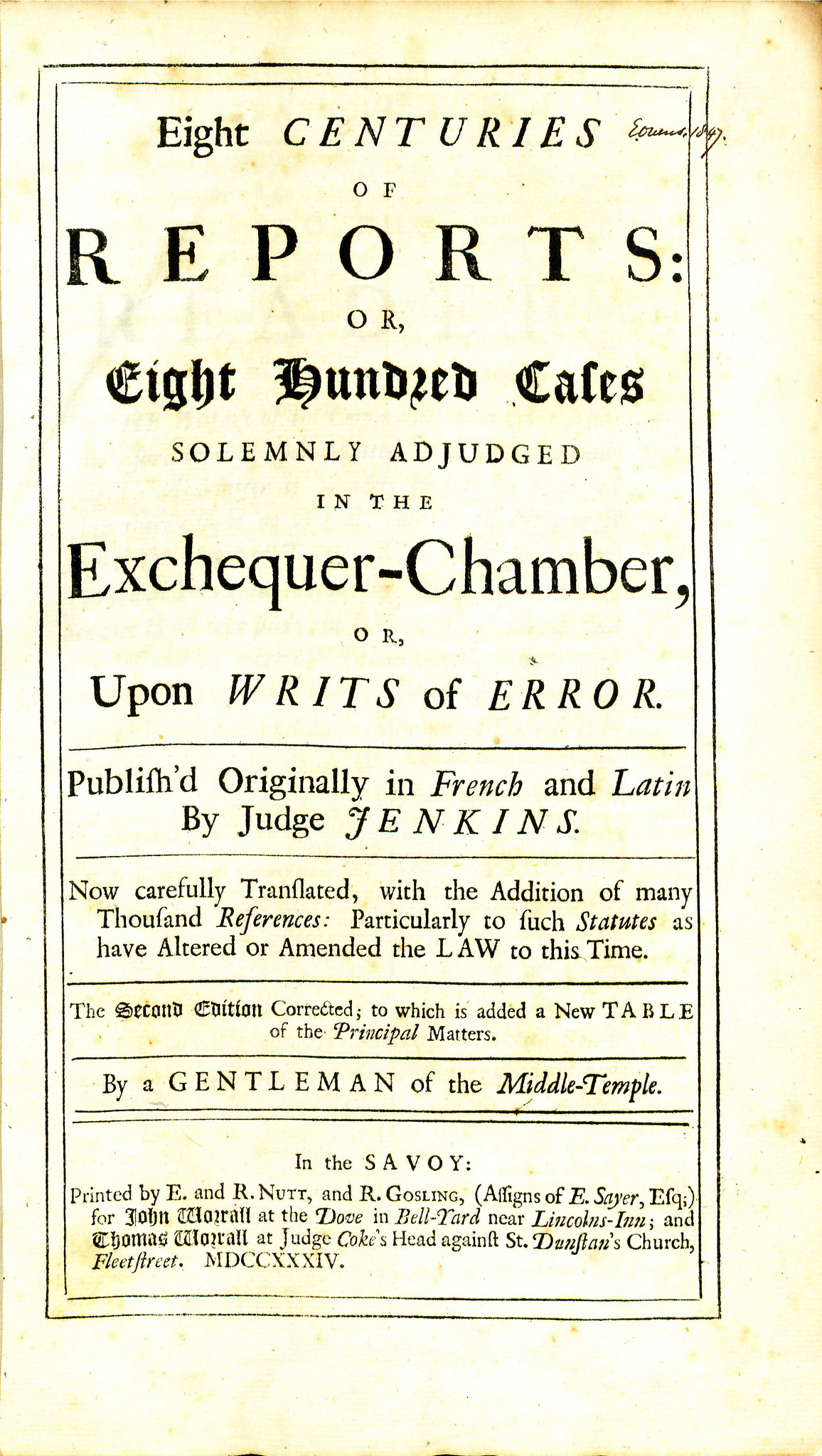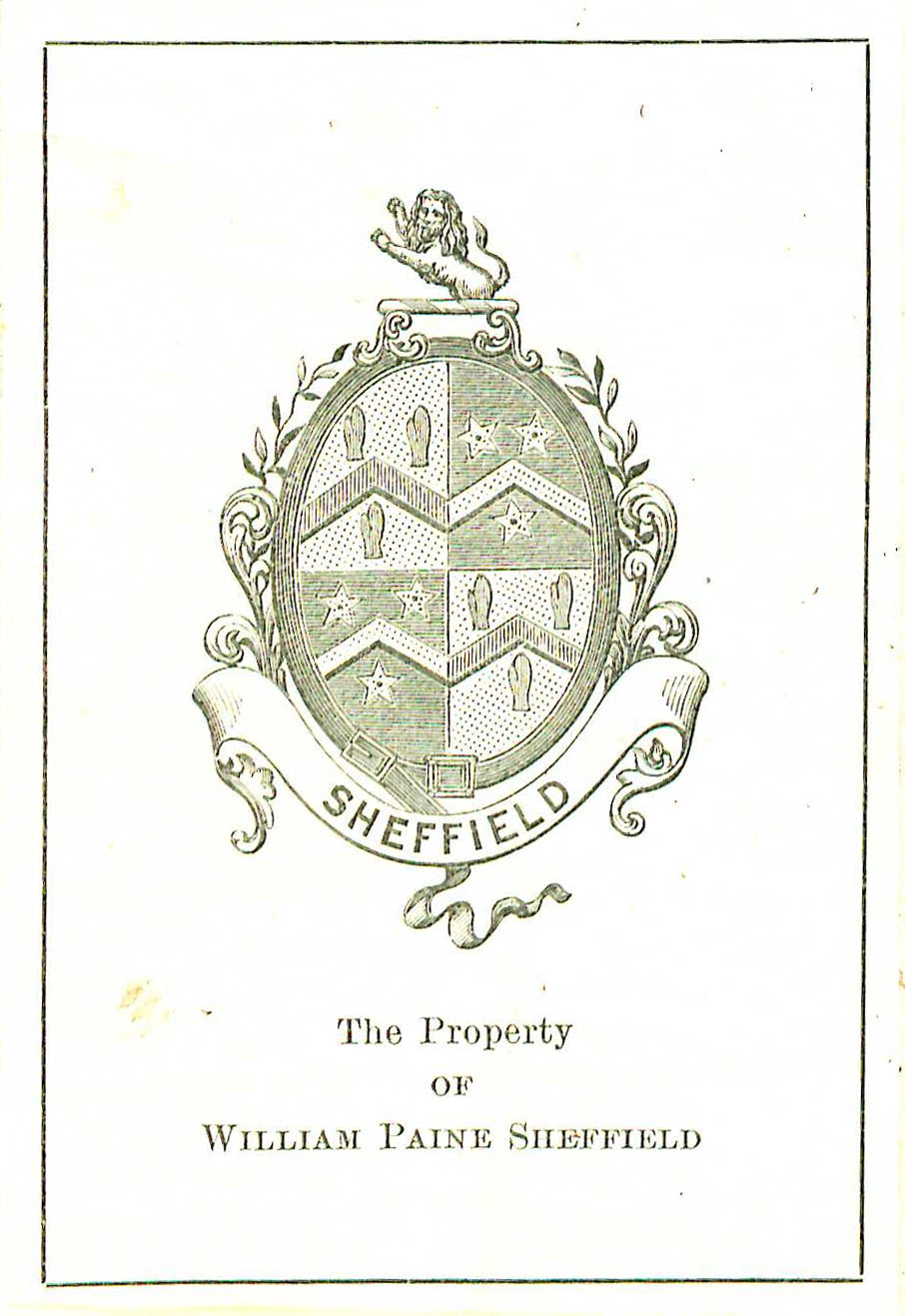Difference between revisions of "Eight Centuries of Reports"
| Line 16: | Line 16: | ||
|pages=x, [10], 341, [28] | |pages=x, [10], 341, [28] | ||
|desc=Folio (32 cm.) | |desc=Folio (32 cm.) | ||
| − | }}[http://en.wikipedia.org/wiki/David_Jenkins_%28Royalist%29 David Jenkins] (1582–1663) was admitted to [http://en.wikipedia.org/wiki/Gray%27s_Inn Gray's Inn] in 1602 and joined the bar in 1609.<ref>Christopher W. Brooks, [http://www.oxforddnb.com/view/article/14726 | + | }}[http://en.wikipedia.org/wiki/David_Jenkins_%28Royalist%29 David Jenkins] (1582–1663) was admitted to [http://en.wikipedia.org/wiki/Gray%27s_Inn Gray's Inn] in 1602 and joined the bar in 1609.<ref>Christopher W. Brooks, "[http://www.oxforddnb.com/view/article/14726 Jenkins, David (1582–1663)]" ''Oxford Dictionary of National Biography'', accessed May 29, 2013.</ref> A dedicated royalist who served in many legal roles, Jenkins was imprisoned in both the Tower and Newgate by the Long Parliament. |
<blockquote>Jenkins used the period of his confinement to write ''Rerum judicatarum centurix octo'', a compilation of judicial decisions made in exchequer chamber between 1275 and 1613. Jenkins said that he intended the work to be useful to all who studied the laws of England by rendering more certain the scattered decisions of former ages. His method was to give a short statement of each case and the decision, along with a marginal reference to the authority from which it was taken, only occasionally offering a commentary of his own. First published in French and Latin in 1661 the text was translated as ''Eight Centuries of Reports'' and was twice reprinted in the eighteenth century.<ref>Ibid.</ref></blockquote> | <blockquote>Jenkins used the period of his confinement to write ''Rerum judicatarum centurix octo'', a compilation of judicial decisions made in exchequer chamber between 1275 and 1613. Jenkins said that he intended the work to be useful to all who studied the laws of England by rendering more certain the scattered decisions of former ages. His method was to give a short statement of each case and the decision, along with a marginal reference to the authority from which it was taken, only occasionally offering a commentary of his own. First published in French and Latin in 1661 the text was translated as ''Eight Centuries of Reports'' and was twice reprinted in the eighteenth century.<ref>Ibid.</ref></blockquote> | ||
{{BookPageBookplate | {{BookPageBookplate | ||
| Line 23: | Line 23: | ||
|caption=Armorial bookplate of William Paine Sheffield, front pastedown. | |caption=Armorial bookplate of William Paine Sheffield, front pastedown. | ||
}} | }} | ||
| − | Jenkins' travails were not in vain as his abridgment enjoyed an excellent reputation. "It partakes of the character of a Digest, a Commentary, and a volume of Reports. He omits those cases relating to Titles of the law that were obsolete when he wrote, and his ''Centuries'' contain some Cases not elsewhere to be found. From the labour bestowed upon the work, and the sound learning which it contains, the volume possesses no ordinary value and authority."<ref>J. G. Marvin, ''Legal Bibliography, or a Thesaurus of American, English, Irish and Scotch Law Books | + | Jenkins' travails were not in vain as his abridgment enjoyed an excellent reputation. "It partakes of the character of a Digest, a Commentary, and a volume of Reports. He omits those cases relating to Titles of the law that were obsolete when he wrote, and his ''Centuries'' contain some Cases not elsewhere to be found. From the labour bestowed upon the work, and the sound learning which it contains, the volume possesses no ordinary value and authority."<ref>J. G. Marvin, ''Legal Bibliography, or a Thesaurus of American, English, Irish and Scotch Law Books'', (T. & J. W. Johnson, Lawbook Sellers, 1847), 423.</ref> John William Wallace, a reporter of United States Supreme Court decisions, adds, "it is a work of admitted accuracy, and, ... possesses very considerable authority.<ref>John William Wallace, ''The Reporters, Arranged and Characterized with Incidental Remarks'', 4th ed., (Boston: Soule and Bugbee, 1882), 70.</ref> |
==Evidence for Inclusion in Wythe's Library== | ==Evidence for Inclusion in Wythe's Library== | ||
Revision as of 10:24, 14 April 2014
Eight Centuries of Reports: or, Eight Hundred Cases Solemnly Adjudged in the Exchequer-Chamber, or, Upon Writs of Error
by David Jenkins
| Eight Centuries of Reports | |
|
Title page from Eight Centuries of Reports, George Wythe Collection, Wolf Law Library, College of William & Mary. | |
| Author | David Jenkins |
| Translator | Theodore Barlow? |
| Published | [London], In the Savoy: Printed by E. and R. Nutt, and R. Gosling, (assigns of E. Sayer, Esq;) for John Worrall at the Dove in Bell-Yard near Lincoln's Inn; and Thomas Worrall at Judge Coke's Head against St. Dunstan's Church, Fleetstreet |
| Date | 1776 |
| Edition | Second edition corrected |
| Language | English |
| Pages | x, [10], 341, [28] |
| Desc. | Folio (32 cm.) |
David Jenkins (1582–1663) was admitted to Gray's Inn in 1602 and joined the bar in 1609.[1] A dedicated royalist who served in many legal roles, Jenkins was imprisoned in both the Tower and Newgate by the Long Parliament.
Jenkins used the period of his confinement to write Rerum judicatarum centurix octo, a compilation of judicial decisions made in exchequer chamber between 1275 and 1613. Jenkins said that he intended the work to be useful to all who studied the laws of England by rendering more certain the scattered decisions of former ages. His method was to give a short statement of each case and the decision, along with a marginal reference to the authority from which it was taken, only occasionally offering a commentary of his own. First published in French and Latin in 1661 the text was translated as Eight Centuries of Reports and was twice reprinted in the eighteenth century.[2]
Jenkins' travails were not in vain as his abridgment enjoyed an excellent reputation. "It partakes of the character of a Digest, a Commentary, and a volume of Reports. He omits those cases relating to Titles of the law that were obsolete when he wrote, and his Centuries contain some Cases not elsewhere to be found. From the labour bestowed upon the work, and the sound learning which it contains, the volume possesses no ordinary value and authority."[3] John William Wallace, a reporter of United States Supreme Court decisions, adds, "it is a work of admitted accuracy, and, ... possesses very considerable authority.[4]
Evidence for Inclusion in Wythe's Library
Bennie Brown discovered a reference to this work in the unpublished portion of John Marshall's law notes and listed this title and edition in his bibliography[5]
Description of the Wolf Law Library's copy
Rebacked with original leather boards and original leather title label on spine outlined in gilt. Front pastedown includes the armorial bookplate of William Paine Sheffield (1820-1907), a United States Representative and Senator from Rhode Island. Purchased from Eveleigh Books.
View this book in William & Mary's online catalog.
References
- ↑ Christopher W. Brooks, "Jenkins, David (1582–1663)" Oxford Dictionary of National Biography, accessed May 29, 2013.
- ↑ Ibid.
- ↑ J. G. Marvin, Legal Bibliography, or a Thesaurus of American, English, Irish and Scotch Law Books, (T. & J. W. Johnson, Lawbook Sellers, 1847), 423.
- ↑ John William Wallace, The Reporters, Arranged and Characterized with Incidental Remarks, 4th ed., (Boston: Soule and Bugbee, 1882), 70.
- ↑ Bennie Brown, "The Library of George Wythe of Williamsburg and Richmond," (unpublished manuscript, May, 2012) Microsoft Word file.

